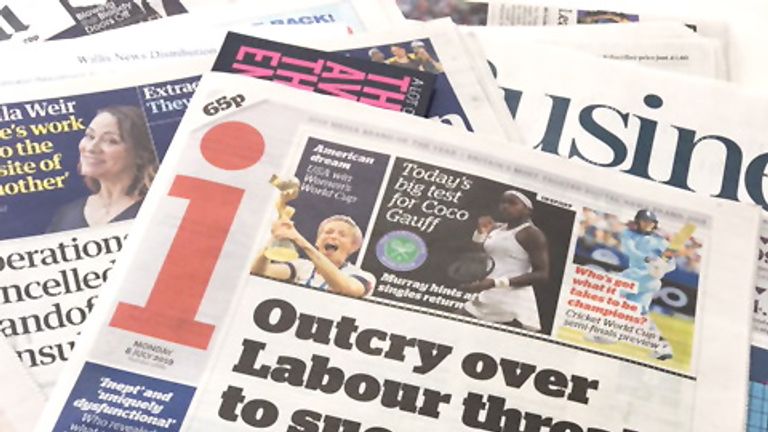Hedge funds in talks to sell i and regional newspapers
The owners of JPIMedia have set a Monday deadline for bids for The Scotsman publisher, Sky News learns.
Monday 8 July 2019 12:45, UK
The hedge funds which took control of the i newspaper and hundreds of regional titles last year are in talks about a break-up and sale of its assets.
Sky News can reveal that JPIMedia and its advisers have set a deadline of Monday for preliminary offers for papers including The Scotsman and The Yorkshire Post.
The first stage of an auction of the company previously called Johnston Press comes weeks after JPIMedia's chief executive, David King, told staff that it was not engaged in a "formal sales process".
Sources said that information sent to prospective buyers included a comparison between JPI's titles and The New York Times - one of the world's most prestigious newspaper brands - and "optimistic" forecasts about a new owner's ability to transform them into lucrative subscription-based assets.
Potential bidders for one of Britain's largest newspaper stables could include Mediahuis, which recently agreed a takeover of Ireland's Independent News & Media, and regional publishers such as Archant and Newsquest.
Daily Mail and General Trust (DMGT), which tabled an offer for the i shortly before it went into administration in November, is said to be less interested in making a formal offer during the current auction.
One insider described the timing of the process, which is being run by Stella EOC, as being motivated by the newspaper industry's need for more consolidation.
In a statement issued to Sky News on Monday, a spokesman for JPIMedia said: "The board of directors has recently appointed a financial adviser to better assess the current and future prospects for the business and its titles.
"We believe that our industry is undergoing substantial change and we are not immune from the changing trends in news consumption and rise of digital news alongside the decline in print advertising and circulation.
"Consolidation within the regional media industry is necessary, which is why we are actively exploring a number of options open to us. We will provide a further update in due course."
JPIMedia employs about 2,000 people across the UK, with its workforce facing an increasingly uncertain future as the news industry has been forced to grapple with the shift towards online, often free, consumption.
The sale process is also likely to draw scrutiny from pensions watchdogs following pressure from Frank Field, the Labour MP who chairs the work and pensions select committee.
Mr Field wrote to The Pensions Regulator following Johnston Press's pre-pack administration to seek clarity about the measures available to prevent retirement schemes being "dumped" into the Pension Protection Fund.
The insolvency process which led to the creation of JPIMedia involved writing off £135m debt, leaving it with £85m of borrowings.
A voluntary redundancy programme and overhaul of the company's property portfolio have also been implemented by the company's new owners, who include Goldentree Asset Management, CarVal and Fidelity.
The hedge fund consortium also injected £35m of new capital into the company to put it on a more sustainable footing.
Sources said there were likely to be a string of suitors for the i, which has been a rare beacon of innovation in Britain's paid-for national newspaper market during the last decade.
The Scotsman and Yorkshire Post are also likely to attract interest from wealthy individuals, although questions remain about the viability of many of JPIMedia's smaller titles.
The break-up and sale of JPIMedia will come in the wake of an independent review of British journalism by Dame Frances Cairncross, which concluded that the government should explore direct funding for local news, as well as new tax reliefs to support public interest journalism.
The explosive growth of digital platforms such as Facebook and Google, the rise of citizen journalism and increasingly bitter debates about fake news have all cast a shadow over the fortunes of historically successful publishers.



